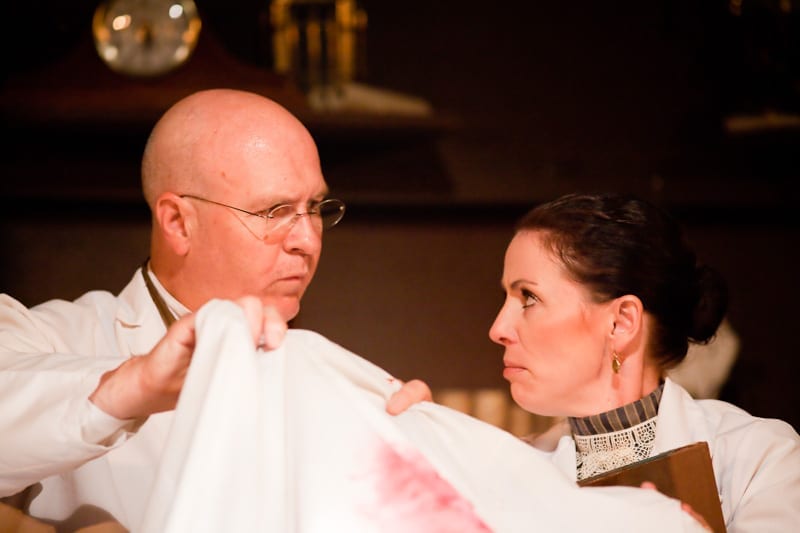PROVO — The biggest compliment that I can give Mortal Fools Theatre Project’s production of Dr. Jekyll & Mr. Hyde (currently playing at the Echo Theatre) is that I am still thinking about it. My brain is spinning as I consider the questions that are raised about the duality of our personalities, the place of (and battles between) our brain, mind, soul and will, and the consequences of our choices.

And the final lines of the play? They may just haunt my dreams.
Based on the classic novella by Robert Louis Stevenson, Mortal Fools made a wise decision by choosing the updated adaption by Jeffrey Hatcher and to put it in the hands of director David Morgan. Morgan has created a gripping and mind-messing production of the classic Jekyll & Hyde story. As the character Utterson mentions in Act 2, Morgan is “very merry in [his] morbidity,” and deftly handles the layers inherent in this psychological thriller.
Morgan is greatly assisted by his ensemble of actors. Led by Christopher Kendrick as Dr. Jekyll, the talent of the entire cast of six (including Christie Clark, Ben Hopkin, Annadee Morgan, Bradley Moss and Reese Purser) shines as the actors gleefully create the myriad of distinct characters necessary to move the story forward. The details that are put into each individual character are both entertaining and necessary, serving to help the audience in keeping the many characters straight, as most of the cast plays several characters. They are especially appreciated, along with several of Morgan’s clear and precise staging choices (the location of the soliloquies, the use of the single door in the set, etc.), in the first 15 minutes when a somewhat overwhelming amount of information is presented. However, as the story moves along, and specific choices become clear—particularly in regards to the script’s creation of Mr. Hyde—the audience is artfully pulled into this dark and disturbing tale.

Sadly, despite the obvious skill of the cast, the one puzzling and unsatisfying aspect of this production is the relationship between Hyde and Elizabeth (played by Christie Clark). Although each individual character is strongly developed, the reasoning behind why Elizabeth falls so completely for a man such as Hyde is never clear. While this may be a problem that is inherent in the script, it is, unfortunately, distracting as the overall story unfolds.
As far as the production elements go, there were many smart decisions made to handle both the demands of the script (with its numerous characters, locations, and timelines) as well as overcoming many of the limitations due to the size and capability of the venue. With the reality of the small stage, scenic designer Nat Reed wisely uses a multitude of specific set pieces (including a masterful use of a very mobile door frame) to solidly convey the multiple locations in the story. These key set pieces give the audience enough of a framework to identify and distinguish the different locales, while not burdening the cast with impossible scene changes. (It should be noted that the numerous scene changes were obviously well rehearsed and—thankfully—quickly executed.) The set design also allowed Morgan and the cast to use the full space, including the aisles, which helps me feel like the audience was part of the action.

Lighting designer Josh Gubler supported both the creation of locales and the mood of the scenes through strategic use of his limited light plot. Finally, costume designer Becca Bailey Klepko supplied the finishing touches by clearly evoking the era of the story and helping to denote the personality and social class of the individual characters. While all the elements work well together, one of the technical highlights of the night was actually found in the sound. From the opening (creepy) horns to the music underscoring throughout the production, the sound design (uncredited in the program) is highly successful in creating the mood of the piece.

Overall, the entire production of Dr. Jekyll & Mr. Hyde works together to create a night that exemplifies the potential power of theatre—highly entertaining while raising thought-provoking ideas and questions. It is the kind of experience that makes people want to return in the hopes that they will understand the layers of the play—and of themselves—just a little bit better. And be thoroughly delighted in the process.
[box type=”shadow”]The Mortal Fools Theatre Project production of Dr. Jekyll & Mr. Hyde plays October 15, 19-20, 22, 25-27, 29-31 at 8 PM and at midnight on the evening of October 31 at the Echo Theatre (145 N. University Ave., Provo). Tickets are $9-18. For more information, visit www.mortalfools.org.[/box]

